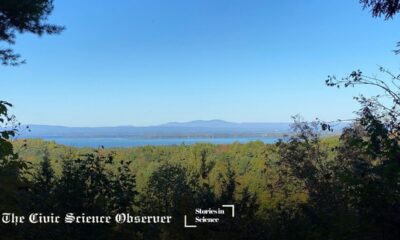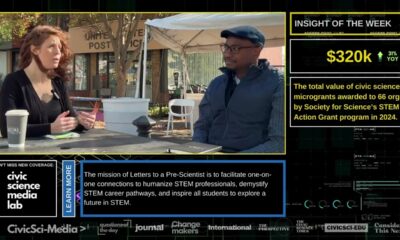Stories in Science Special Series
The Things I Can’t Not Do

– by Myron Shekelle – Research Associate, Department of Anthropology, Western Washington University –
[dropcap]I[/dropcap]f your job didn’t pay any money, would you continue to do it anyway? As a scientist, I have had the opportunity to know the answer to this philosopher’s question.
In April 1996, I was surveying tarsiers on Malenge Island, a tiny spot of land less than 20 miles from the equator, in Tomini Bay of Sulawesi, itself the eleventh largest island in the world. I had walked a little more than an hour through the heat of the tropical afternoon, through coconut groves and agroforestry habitats, with my Indonesian student counterpart and my Sulawesi-born field assistant. The trail had crossed a sloping limestone cliff-face with dramatic vistas of the ocean below. Now, we were clearing brush from around a clump of bamboo in which we thought tarsiers had been sleeping the day away.
Our plan to trap them that evening was sabotaged by my own clumsy use of a machete. While slicing through a piece of bamboo – the diameter of an axe handle – I inadvertently created a razor-sharp bamboo spear and plunged the tip of it into my calf just behind the knee. It felt as if a half-inch wide sliver of bamboo had broken off behind my calf muscle, extending from my knee to my ankle. I collapsed to the ground, and stayed there as I urged my team to keep working. After a long examination, I could not find any evidence of a splinter, and I concluded that the spear tip had merely hit a nerve that had caused a severe cramp in my calf muscles, unlike anything I had ever experienced. I could not walk on it, but I surmised it was safe for me to hop.
After the sun set, and we had failed to capture any tarsiers, it was time to go back. A late afternoon rain had turned the dusty tropical trail to mud. The sloping limestone cliff face with the ocean below, which had caused us to walk cautiously when dry in the daylight, was a different experience altogether when we crossed it at night, wet and slippery, with me hopping on one foot. I have no recollection how long the return journey took given I was wet, sore, hungry, and had failed to accomplish our objective. We retired to our rooms, dirty and exhausted, where our bed was a straw mat on a rough-hewn log floor. There was no protection from mosquitoes, no electricity, and only rudimentary plumbing. And here is the punch line to my story: at 3 a.m. the next morning, we woke up, strapped on our equipment, and went back and did it all over again.

Myron Shekelle
The first time a journalist asked me the question, “why do you do what you do?” I was stumped. It had never occurred to me that anyone would ask me such a question, let alone be interested in the answer. After some blank looks, I told the journalist the story above, as no other answer had come to mind. Like some apophatic theology of passion, I could only describe my behavior by comparing it with the things I had not done; things that might have seemed sensible, like, for example, not getting up at 3 a.m. the next morning and doing it all over again. Through the years of my dissertation and post-doctoral research, my team and I were surveying tarsiers at dawn and dusk, night after night. There were occasional times that my team had a day off, and I would use my days off to wake up before dawn and survey for tarsiers. I commuted past world-renowned tourist localities and it never once occurred to me to stop and visit any. None. “The things you can’t not do,” one colleague said to me upon hearing my story of the bamboo wound and the hop back “home” over slippery death falls. Perplexed, I asked “huh?”. “It is one of the definitions of passion,” she explained.
Tarsiers are tiny nocturnal primates – the size of your fist – with huge eyes and ears. They are almost unbearably cute. But this is not why I study them. Prior to tarsiers, I had studied fossils, that is, rocks. I based my tarsier project on a similar one of crickets. I had never even seen a tarsier at the time I chose this career path. I just knew from the scientific literature it would be a good project. Results from my doctoral dissertation research indicated there were as many as sixteen unrecognized species of tarsier on Sulawesi, waiting to be described. My work, and that of my colleagues, has led to the recognition of eleven of those thus far, including two new species that my authorship group named on May 4 2017. Conservation is a rear-guard fight against humanity’s onslaught upon nature, and we use these new species to help set conservation priorities for some of the most important tropical forested regions in the world. Why? We do this such that when that day comes when humans have finally chosen to live sustainably within this planet, we will have saved the most and best of what could be saved.
Meanwhile, now in my third decade as a scientist, I have known the answer to the question that began my story. Although my work has paid me nothing at all for most of the time, I have continued to do it. I have raised more than a half-million dollars in grant support, enjoyed publication productivity rates similar with other mid-career colleagues in tenure-track positions, and generally great teaching evaluations. All this was done without having once held a permanent position within my field. That is not a complaint; it is just a description of the way things have been for me. I have earned my money in temporary positions, teaching English, and even painting houses. Earning no money at all while doing the thing I can’t not do: is there any more powerful career guidance than that?
Featured Image by Myron Shekelle
The CS Media Lab is a Boston-anchored civic science news collective with local, national and global coverage on TV, digital print, and radio through CivicSciTV, CivicSciTimes, and CivicSciRadio. Programs include Questions of the Day, Changemakers, QuickTake, Consider This Next, Stories in Science, Sai Resident Collective and more.

-
Audio Studio1 month ago
“Reading it opened up a whole new world.” Kim Steele on building her company ‘Documentaries Don’t Work’
-
 Civic Science Observer1 week ago
Civic Science Observer1 week ago‘Science policy’ Google searches spiked in 2025. What does that mean?
-
Civic Science Observer1 month ago
Our developing civic science photojournalism experiment: Photos from 2025
-
Civic Science Observer1 month ago
Together again: Day 1 of the 2025 ASTC conference in black and white
Contact
Menu
Designed with WordPress
























